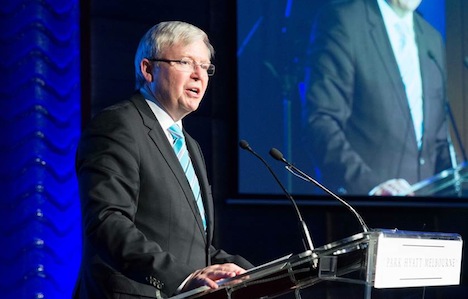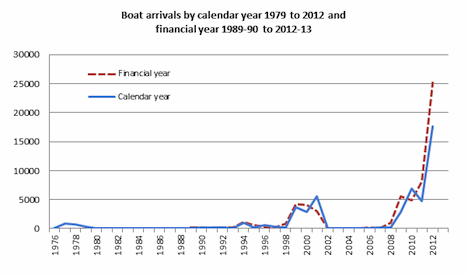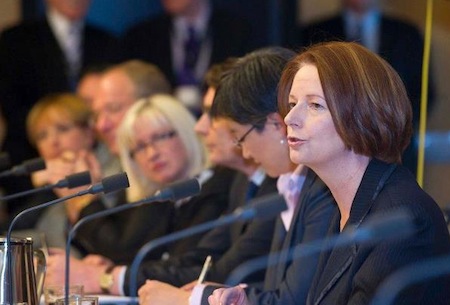Australian prime minister Kevin Rudd kicked off his campaign for reelection over the weekend after setting September 7 as Australia’s election date — just over a month from today.![]()
Chief among the issues that will dominate the campaign debate is the Australia’s current immigration conundrum, which has been the subject of Rudd’s most controversial policy reversal since he ousted former prime minister Julia Gillard five weeks ago in the latest of years of intraparty battles to become the leader of the Labor Party and, once again, prime minister. Rudd last month reintroduced elements of the ‘Pacific solution’ of former prime minister John Howard — a solution that Rudd abandoned as prime minister in 2007 — in a shift on asylum policy that leaves Labor now arguably to the right of anything the Howard government ever enacted.
Imagine, for a moment, that back in 2001, then-president George W. Bush introduced a policy that any foreign national apprehended crossing the southern U.S. border would be shipped to either, say, Greenland or Grenada, with whom U.S. officials negotiated a special arrangement to hold and process migrants bound for the United States.
Now imagine that Democratic president Barack Obama won election in 2008 on a promise to end that policy, and that he promptly did so — only to reintroduce the ‘Greenland solution’ a month before seeking reelection — with the added caveat that foreign nationals will never be resettled in the United States, just in Greenland and Grenada.
Though that’s not exactly what Australia is doing, it’s pretty close. Rudd, who initially came to power on a promise to reverse the ‘Pacific solution’ six years ago, has now embraced a version of the ‘Pacific solution’ on steroids just one month before Australia’s general election — asylum seekers traveling to Australia by boat will be transferred to Papua New Guinea and Nauru where, if they qualify for asylum, will be resettled in Papua New Guinea or Nauru, not in Australia.
Rudd’s shift has left opposition leader Tony Abbott, flat-footed on an issue that Abbott was expected to use to advantage in the coming election, but it’s left Rudd subject to criticism that he’s carelessly tossing aside the human rights of asylum seekers, to say nothing of his previous principles, in order boost his own reelection chances.
Although Australia has always been a popular draw for migrants, the latest crisis stems from the late 1990s and early 2000s, when the number of refugees from Iraq and Afghanistan (and also from Vietnam, Myanmar/Burma and Sri Lanka) began to rise. Howard instituted the ‘Pacific solution’ in 2001 — Australian naval officials who apprehended refugees off the coast of Australia would no longer escort them to Australia, but instead transfer them to processing centers on Christmas Island, on Manus Island in Papua New Guinea and on Nauru where, eventually, each refugee’s asylum case would be reviewed. While some refugees were eventually granted asylum in Australia and New Zealand, around a third of the refugees were refused asylum and sent home.
The policy seems to have worked because boat migration fell rapidly by the mid-2000s.
But when Rudd came to power in November 2007, his Labor government quickly ended the policy, in part due to criticism from human rights organizations over the sanitary conditions at the processing centers and the lengthy amount of time that asylum-seekers would spend in detention at the centers. It was one element of Rudd’s ‘Big Australia’ campaign to reduce barriers to immigration and boost the country’s population.
But look what’s happened since 2007:
Ending the ‘Pacific solution’ eliminated what had become a massive disincentive to the decision to risk life and safety to seek a better future in Australia. So the Rudd policy encourage an unprecedented wave of migration, supplemented by six years of suppressed demand, and all of the horrors that come with it, including the horrors of people trafficking, higher incidence of fatal crashes at sea. For Australian policymakers, asylum policy had become a lose-lose proposition: the ‘Pacific solution’ left the Australians subject to charges of humanitarian lapses and of subcontracting its moral responsibility to the much-poorer Papua New Guinea; the revocation of the ‘Pacific solution’ encouraged dangerous migration that led to habitual headlines of death and exploitation in its northern seas. (Here’s one narrative of the long and arduous journey from Afghanistan to Australia from Amnesty International). Continue reading Rudd’s new policy for asylum seekers tops campaign agenda in Australia


